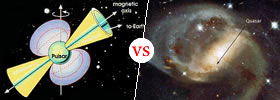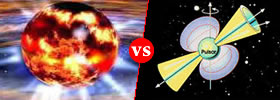Science & Mathematics
|
Bacteria are single celled and prokaryotic organisms. They replicate in an asexual manner. They can be harmful as well as beneficial; it depends upon the type of bacteria. On the other hand, viruses are non living pathogens and are acellular. Virus also needs a host cell in order to reproduce. Most of the Viruses do not serve any useful purpose. |
|
Bacteria are single celled and Prokaryotic organisms. They replicate in an asexual manner. They can be harmful as well as beneficial; it depends upon the type of bacteria. On the other hand, Protozoa are single-celled Eukaryotic organisms having varied morphology and physiology.
|
|
Pulsar is a rotating neutron star, that is highly magnetized and it emits a beam of electromagnetic radiation. Quasar stands for quasi-stellar object and that refers to any of the celestial object that is similar to a star in appearance but has comparatively high red shifts. They differ in various characteristics like size, type, brightness, etc. |
|
Neutron stars are the collapsed cores of some massive stars, created during supernova explosions. Pulsar is a rotating neutron star, that is highly magnetized and it emits a beam of electromagnetic radiation. |
|
United States (U.S.) and United States of America (U.S.A.) refers to a federal republic that consists of fifty states and a federal district. Therefore, there is no difference between the two. |
|
Alpha radiation can be described as producers of high energy and fast moving helium particles. Beta radiations are producers of fast moving electrons and can penetrate further in comparison to the alpha particles. Gammy radiations are high energy radiations that are in the form of electromagnetic waves and these radiations do not give off any particle like alpha and gamma radiations. They differ in many contexts like penetration power, mass, speed, etc. |
|
A geosynchronous orbit is an orbit around a planet which has the same orbital period as the planet’s rotation period. Geostationary orbit is a kind of geosynchronous orbit but with an addition feature. It remains stationary with respect to a single point on the surface of the planet. |
|
Forest can be defined as a large area that is coveted with trees and underbrush. It is also referred to as wood or woods. Jungle is a dense forest that is nearly impenetrable. A forest is marked by large covered area with tall trees, whereas a jungle is marked by a concentrated area with dense shrubs, grasses and shorter trees. |
|
A hurricane is tropical cyclone that is characterized by thunderstorms, strong winds and heavy rains. A hurricane needs a warm area to develop and cannot exist in cold areas; hence they are most common in tropical areas. A tornado on the other hand is a violent rotating column of air that is contact with both the ground as well as a cumulonimbus cloud. A hurricane can cause wind speed of 74mph to over 155mph, compared to a tornado whose wind speeds are between 40mph and 360mph. Tornadoes form on the land, while some can form on water; however a hurricane forms on the water. |
|
A city is a large and permanent settlement. A county is geographically larger than a city. Counties contain cities, villages, towns, townships or other municipal corporations. |
|
A cyclone is an area of closed, circular fluid motion rotating in the same direction as the Earth. A typhoon is a mature tropical cyclone and is a sub-type of cyclone. It mostly occurs in the northwestern part of the Pacific Ocean between 180° and 100°E. Similar phenomena that affect the eastern north Pacific are known as Hurricanes. |
|
Cyclones are considered as oceanic phenomena, while tornadoes can occur over land as well as water. A cyclone is generally defined in meteorology as an area of closed, circular fluid motion rotating in the same direction as the Earth. A tornado is a violent rotating column of air that is contact with both the ground as well as a cumulonimbus cloud. |
|
A hurricane is also called a tropical cyclone, making it a type of cyclone. A cyclone and a hurricane only have a few differences. A hurricane is most commonly found in tropical zones, over warm waters in the Atlantic and Pacific Ocean, while cyclones are found in the Southern Pacific Ocean and the Indian Ocean. |
|
Animal cells do not have rigid cell walls and chloroplasts, and they have smaller vacuoles. Plant cells have a rigid cell wall and chloroplasts and have a large central vacuole. |
|
Xenophobia is the fear of the different and the hesitance of accepting the unknown, while racist is a downright rejection of someone that is different from you in terms of race, color, ethnicity, etc. |
Pages
 |
 |
 |
 |
 |
 |
 |
 |















